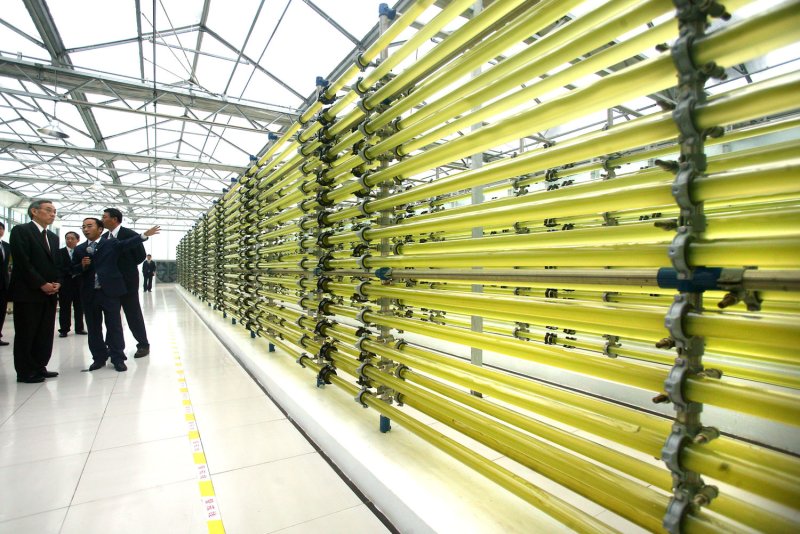Growing algae in wastewater could boost yields to make biofuels while also cleaning polluted water, researchers at Rice University say. File Photo by UPI Photo/Stephen Shaver |
License Photo
HOUSTON, April 2 (UPI) -- Municipal wastewater makes for good algae food. And algae makes for a good filter. By growing high-volume strains of oil-rich algae in repurposed wastewater, researchers at Rice University have solved two problems with one process.
In the end, the algae can be harvested to make biofuels, and the wastewater can be processed and funneled back into the system. The algae effectively removes 90 percent of nitrates and more than 50 percent of phosphorous from the water, two pollutants which wastewater processing plants have not been able to find affordable ways to expel.
Excessive amounts of nitrates and phosphorous in wastewater runoff -- from agricultural and industrial sources -- have been blamed for encouraging unwanted algal growth in rivers and oceans.
The development could also, once again, make algae-based biofuels economically viable.
"Biofuels were the hot topic in algaculture five years ago, but interest cooled as the algae industry moved toward producing higher-value, lower-volume products for pharmaceuticals, nutritional supplements, cosmetics and other products," study author Meenakshi Bhattacharjee, a researcher at Rice's biosciences faculty, explained in a press release.
"The move to high-value products has allowed the algaculture industry to become firmly established, but producers remain heavily dependent on chemical fertilizers," Bhattacharjee added. "Moving forward, they must address sustainability if they are to progress toward producing higher-volume products, 'green' petrochemical substitutes and fuels."
The researchers experimental growth tanks featured different combinations of algal strains. Some hosted fish to prey on algae-eating zooplankyton. All the tanks were fed with filtered wastewater from the Houston Department of Public Works and Engineering. And all the tanks performed surprisingly well.
Bhattacharjee says more research will need to be done to confirm that the process is profitable, but their experiments produced higher volumes of algae and cleaner wastewater than previous efforts have. Performing the experiments in the late summer in Houston likely helped.
"Using wastewater would be one of the best solutions to make algaculture sustainable," she said. "If temperature is key, then cultivation may be more economical in the Southeast and Southwest."
The new research was published in the journal Algae.















